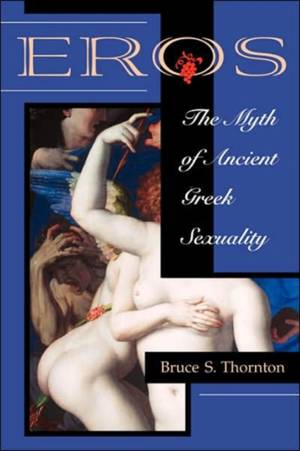
- Afhalen na 1 uur in een winkel met voorraad
- Gratis thuislevering in België vanaf € 30
- Ruim aanbod met 7 miljoen producten
- Afhalen na 1 uur in een winkel met voorraad
- Gratis thuislevering in België vanaf € 30
- Ruim aanbod met 7 miljoen producten
Zoeken
€ 106,95
+ 213 punten
Uitvoering
Omschrijving
Eros: The Myth of Ancient Greek Sexuality is a controversial book that lays bare the meanings Greeks gave to sex. Contrary to the romantic idealization of sex dominating our culture, the Greeks saw eros as a powerful force of nature, potentially dangerous and in need of control by society: Eros the Destroyer, not Cupid the Insipid, is what fired the Greek imagination. The destructiveness of eros can be seen in Greek imagery and metaphor, and in their attitudes toward women and homosexuals. Images of love as fire, disease, storms, insanity, and violence--top 40 song clichés for us--locate eros among the unpredictable and deadly forces of nature. The beautiful Aphrodite embodies the alluring danger of sex, and femmes fatales like Pandora and Helen represent the risky charms of female sexuality. And homosexuality typifies for the Greeks the frightening power of an indiscriminate appetite that threatens the stability of culture itself. In Eros: The Myth of Ancient Greek Seualily, Bruce Thornton offers a uniquely sweeping and comprehensive account of ancient sexuality free of currently fashionable theoretical jargon and pretensions. In its conclusions the book challenges the distortions of much recent scholarship on Greek sexuality. And throughout it links the wary attitudes of the Greeks to our present-day concerns about love, sex, and family. What we see, finally, are the origins of some of our own views as well as a vision of sexuality that is perhaps more honest and mature than our own dangerous illusions.
Specificaties
Betrokkenen
- Auteur(s):
- Uitgeverij:
Inhoud
- Aantal bladzijden:
- 300
- Taal:
- Engels
Eigenschappen
- Productcode (EAN):
- 9780813332260
- Verschijningsdatum:
- 13/02/1998
- Uitvoering:
- Paperback
- Formaat:
- Trade paperback (VS)
- Afmetingen:
- 153 mm x 229 mm
- Gewicht:
- 417 g

Alleen bij Standaard Boekhandel
+ 213 punten op je klantenkaart van Standaard Boekhandel
Beoordelingen
We publiceren alleen reviews die voldoen aan de voorwaarden voor reviews. Bekijk onze voorwaarden voor reviews.








